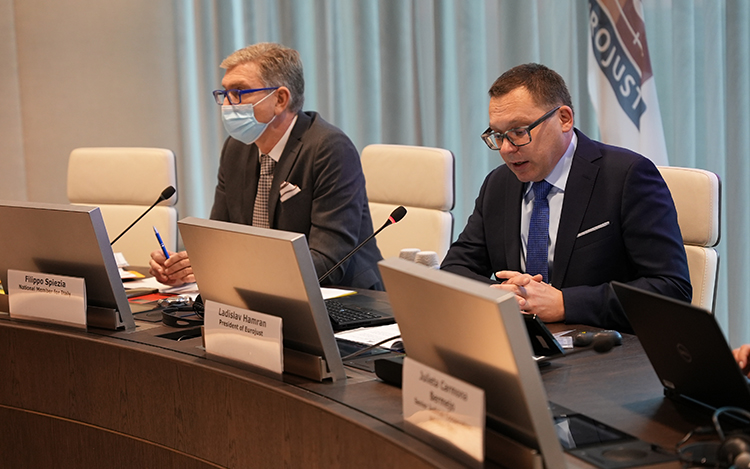Fighting the criminal networks responsible for smuggling migrants across Europe remains one of the top priorities for the European Union, its Member States and Eurojust. The renewed EU action plan against migrant smuggling (2021-2025) enhances Eurojust’s prominent role, and reinforces the need for cooperation between law enforcement and the judiciary, relevant EU agencies and third countries of origin and transit. What does the EU action plan against migrant smuggling mean for judicial national authorities and how can Eurojust assist them and the European Commission in its implementation? These were amongst the key questions discussed at Eurojust’s Annual Meeting on Migrant Smuggling in The Hague on 4-5 November, with 25 countries and 7 international organisations represented.

‘This meeting hosted by Eurojust marks an important step forward in our commitment in the fight against migrant smuggling and trafficking in human beings’, said Filippo Spiezia, Italian National Member at Eurojust and Chair of the Anti-Trafficking Team. ‘We have set the ground to ensure an international and worldwide approach in judicial cooperation procedures to support judicial authorities in their difficult challenge to tackle the smuggling of migrants and the trafficking of human beings’.
A key outcome of the meeting is the decision to draw-up a roadmap before the end of 2021, explaining Eurojust’s responsibilities, the expectations of the national judiciaries and how to effectively work together. This roadmap will complement the EU strategy on combatting trafficking in human beings. Practitioners discussed with the EU Anti-Trafficking Coordinator and the OSCE Special Representative the main challenges in migrant smuggling cases where migrants have suffered any sort of exploitation.
Currently, Eurojust has 10 in-house Liaison Prosecutors as well as 60 third country contact points worldwide. The South Partner Country representatives of Algeria, Tunisia and Israel were present at the meeting, and there was agreement for the need to enhance the operational judicial cooperation with South Partner Countries and the West African Network of Central Authorities and Prosecutors.

During the meeting, the European Commission invited EU Member States to make more use of Eurojust’s available support to migrant smuggling investigations, through operational tools such as joint investigation teams. Eurojust’s newly published Booklet on Judicial use of information following the debriefing of migrants at external borders was also announced as a useful tool for judicial practitioners and the law enforcement community. It emphasizes the need for the judiciary’s early involvement in investigations, and the importance of obtaining information from migrants as early as possible.
The increasing trend of using digital platforms to facilitate migrant smuggling was highlighted during the meeting. Participants called for policy-makers to update the legislative framework to tackle digital smuggling head-on.
In 2020, Eurojust supported 217 smuggling cases and so far this year has worked on 113 cases.
